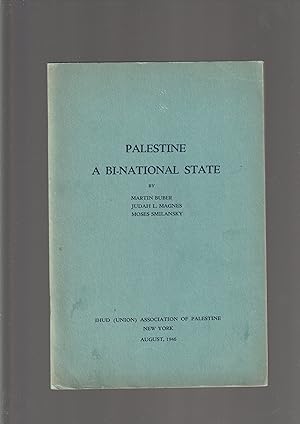Descripción
80 pages. 227 x 151 mm. Contents: Preface, by J.L. Magnes.--Written statement to the Anglo-American committee of inquiry, Jerusalem, March 5, 1946, by the Ihud (Union) association of Palestine.--Oral testimony before Anglo-American committee of inquiry, by Martin Buber, J.L. Magnes, Moses Smilansky--Jerusalem, March 14, 1946.--Letter to New York times, June 3, 1946, by J.L. Magnes.--Palestine and the Middle East, NBC broadcast, New York, June 22, 1946, by J.L. Magne. Moshe Smilansky (February 24, 1874 the village of Telepino in Kiev Governorate, then part of the Russian Empire - October 6, 1953 Tel Aviv, Israel) was a pioneer of the First Aliyah, a Zionist leader who advocated a bi-national state with the Arabs. He was a farmer and a prolific author of fiction and non-fiction literary works. He was born to a family of farmers in Telepino, immigrated to Eretz Israel in 1890 when it was part of the Ottoman Palestine. He planned to study at Mikve Israel, but refused to study there in French and with his family?s help purchased land in Hadera in 1891. He prevailed on his parents to settle in Eretz Israel and after his family's return to Russia Smilansky became an agricultural worker in Rishon LeZion before settling in Rehovot in 1893. In addition to being an agricultural pioneer (vineyards, almonds and citrus groves owner), he was one of the founders of the Hitahadut ha-Moshavot bi-Yehudah ve-Shomron, whose chairman he became during World War I. In 1922 Smilansky was one of the founders of Hitahdut HaIkarim, which he headed during its early years and the editor of its periodical, Bustenai, from 1929 to 1937. Smilansky volunteered to the Jewish Legion in 1918, and was the commander of the Haganah Organization in Rehovot during the 1921 Jaffa Riots. Smilansky was also active during the 1920s and 1930s in organizations for the reclamation and acquisition of land, especially in the Negev. Smilansky, considered himself a disciple of Ahad Ha'am, was an active Zionist, wrote many essays and articles, which he has contributed to Hebrew periodicals published in Russia and in Germany (Ha-Tsefirah, Ha-Meliz, Ha-Tzofeh, Lu'ah Ahiasaf, Ha-Shilo'ah, and Ha-Olam), sometimes under the pen name "Ben Hava". Smilansky also published in Hebrew periodicals in Eretz Israel, where he was one of the first contributors (writing under the pen name "Heruti") to the journal of Ha-Po'el ha-Tsa'ir and a co-founder of Ha-Omer literary journal together with David Yellin and S. Ben Zion (Simha Alter Guttman). Smilansky was a delegate to the Seventh Zionist Congress in Basel in 1905. In the 1930s Smilanskysky was a member of "The Five" (together with Gad Frumkin, Pinhas Rutenberg, Moshe Novomeysky, and Judah Leon Magnes), who met with Arab leaders in an attempt to explore the idea of a bi-national state. In the 1940s, with the Arabs in mind, he opposed the struggle against the British in Palestine. In 1946, Smilansky, together with members of Ihud, advocated the establishment of an Arab-Jewish state to the Anglo-American Committee of Inquiry. Smilansky's literary works include autobiographical novels as well as memoirs and non-fiction depictions of the Zionist pioneers of the First Aliyah and Second Aliyah that were collected in the four-volume Mishpahat ha-Adamah and the six-volume Perakim be-Toledot ha-Yishuv. His groundbreaking fiction stories and sketches depicting Arab life in Ottoman Palestine were first published in 1906 under the pseudonym Hawaja Mussa (Hebrew:khudja Musa), and collected in the volume Bene Arav, first published in Odessa in 1911. Martin (Mordechai) Buber (Vienna, February 8, 1878 ? Jerusalem, Israel, June 13, 1965) was an Austrian and Israeli Jewish philosopher best known for his philosophy of dialogue, a form of existentialism centered on the distinction between the I-Thou relationship and the I-It relationship. Buber came from a family of observant Jews, but broke with Jewish custom to pursue secular studies in philosophy. . . . N° de ref. del artículo 016530
Contactar al vendedor
Denunciar este artículo
![]()




